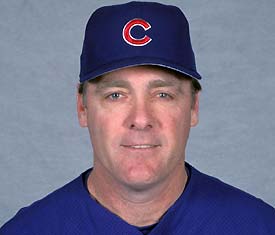| Bruce Kimm Full Name: Bruce Edward Kimm Height: 5'11" Weight: 175 lbs. Born: June 29, 1951 in Cedar Rapids, Iowa Died: Major League Career: 1976 to 1980 Managerial Debut: July, 6 2002 |
 |
| Bruce Kimm Full Name: Bruce Edward Kimm Height: 5'11" Weight: 175 lbs. Born: June 29, 1951 in Cedar Rapids, Iowa Died: Major League Career: 1976 to 1980 Managerial Debut: July, 6 2002 |
 |
| Year | TM/L | G | W | L | PCT | M/Y | W-EXP | A-E | Standing |
| 2002 | CHI-N | 78 | 33 | 45 | 0.423 | 2-2 | 37.6 | -4.6 | 5 Central |
| Totals | 1 | 78 | 33 | 45 | 0.423 | 37.6 | -4.6 |
Kimm, 51, was in his second season as manager of the Cubs' Triple-A Iowa team. He led the Iowa Cubs to the Pacific Coast League's Central Division title last year with a 83-60 record. This year, Kimm's team was 44-45. "We have every intention of giving Bruce the opportunity to complete the season," newly named Cubs general manager Jim Hendry said Friday in Atlanta. "It's not a day-to-day thing at all."
Hendry bypassed former managers Rene Lachemann and Larry Rothschild, both on the current Cubs staff, and picked Kimm. "We feel Bruce Kimm is a real good choice," Hendry said. "He's an outstanding baseball guy and has been in the game for over 30 years. He brings a lot to the table and we felt he was real deserving of the opportunity." Making the change does not mean the Cubs are giving up on the current campaign. "We're not looking at it that the season is over yet," Hendry said. "Obviously winning more ballgames is the reason we're here today. We haven't won enough of them. We'll see how Bruce can do and then assess the club before the [July 31 trading] deadline." This was Kimm's seventh season as a minor league manager. He also spent 12 years as a Major League coach, and was the Marlins bullpen coach in 1997 when the team won the World Series. Current Cubs outfielder Moises Alou was on that team. Kimm previously managed in the Cubs farm system at Double-A Orlando during the 1995-96 seasons. Kimm was named the Southern League's Manager of the Year after the 1995 season and selected as that league's top managerial prospect by Baseball America. He is not new to the Majors, having coached for Cincinnati (1984-1988), Pittsburgh (1989-1990), San Diego (1991-1992), Florida (1997-98), and Colorado (1999). He spent the 2000 season as a scout for the Rockies. Kimm worked with Baylor for the last three seasons, giving him updates on the Triple-A players. "I'm taking over for a real professional, a guy who always treated me great," Kimm said of Baylor. "This is part of baseball. It's a good opportunity for me. I'm looking forward to taking over this ballclub. This is a good ballclub. I like the players on the ballclub and it's a good situation and I'm very fortunate." "I'm just going to go about my business," Kimm said. "I've been around a whole lot of good managers. It's nice to say you can do certain things, but players dictate what you're trying to do." Kimm played professionally from 1969-80, appearing in 186 games for Detroit (1976-77), the Cubs (1979) and the White Sox (1980). He caught all of Mark "The Bird" Fidrych's starts in 1976. Kimm was asked if he was an "old school"-type of player. "If it's 'old school' to treat players the way you want to be treated, then I'm 'old school,'" Kimm said. "I try to treat the players exactly the way I want to be treated. The only thing I ask is to play as hard as you can and play every day to win."
Following a dismal 2002 season, Bruce Kimm was fired by the Cubs in his inaugural season as a manager.
| ||||||||||||||||||||||||||||||||||||||
| TM/L G W L PCT M/Y W-EXP A-E Standing |
Team and League Games managed (including ties) Wins Losses Percentage of games won Manager/Year (The latter number indicates how many managers the team employed that year, while the former indicates the chronological position of the manager [i.e. 1-2 would mean this manager was the first of two managers during that year]). Expected Wins. Calculated for the team based on its actual runs scored and allowed. A team that allows exactly as many runs as it scores is predicted to play .500 ball. Actual Wins Minus Expected Wins (A measure of the extent to which a team outperformed (or underperformed) its talent. (Over time this reflects good/bad managing). Team's final standing for the season or, in the case of multiple managers, the standings at the time the manager departed. |